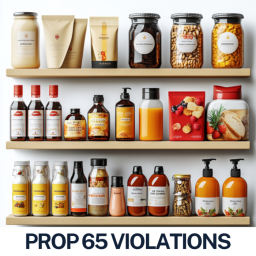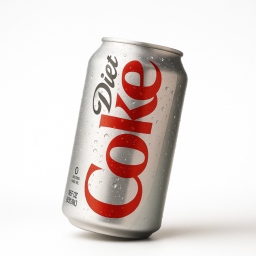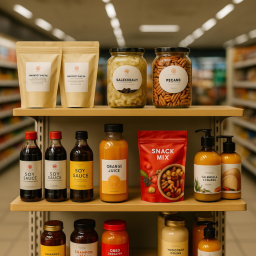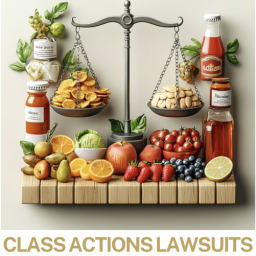
California Proposition 65 Enforcement: September 2025 Update
California’s Proposition 65 enforcement remained vigorous in September 2025, with 509 Notices of Violation (NOVs) issued. Lead continued to dominate enforcement, while bisphenol-based compounds (BPS, BPA), phthalates (DEHP, DINP), and perfluorinated substances (PFOA, PFOS) drew consistent scrutiny across food-contact goods, packaging, and retail products.
This month’s enforcement data reveals a sharp rise in metal and chemical exposure claims within consumer products, particularly among imported goods and private-label retailers. Monitoring these trends remains critical for manufacturers, distributors, and licensors managing compliance risks in California’s complex Proposition 65 landscape.
September 1–30, 2025 Proposition 65 Notice of Violation Summary
| Number of Violations | Listed Chemicals | Types of Products Targeted |
| 327 | Lead | Seafood, ceramics, kitchenware, metallic accessories |
| 109 | BPS | Thermal labels, receipts, food packaging |
| 56 | DEHP | Plastic goods, vinyl accessories, bags |
| 35 | Cadmium | Paints, glazes, metal tools, pigments |
| 20 | BPA | Food containers, jar linings, bottles |
| 16 | PFOA | Waterproof goods, packaging, cosmetics |
| 12 | Δ9-THC | CBD and cannabis-derived oils, topicals |
| 11 | Gasoline vapors | Automotive and hardware products |
| 10 | DINP | Flexible plastics, PVC items |
| 4 | PFOS | Personal care packaging, coated fabrics |
What Is Proposition 65 and Why Does It Matter?
Proposition 65 (the Safe Drinking Water and Toxic Enforcement Act of 1986) requires businesses to warn consumers about exposure to chemicals known to cause cancer, birth defects, or reproductive harm. The list now includes more than 900 chemicals, such as lead, cadmium, BPA, and PFAS compounds.
Failure to comply can result in:
- Civil penalties up to $2,500 per violation per day
- Mandatory reformulation, labeling, or product withdrawal
- Costly enforcement actions by private plaintiffs
Notable Chemical Trends – September 2025
Lead in Consumer and Food Products
Lead remains the most cited chemical, appearing in seafood, ceramics, and metallic household goods. Retailers continue to face liability for trace metals leaching from glazes and coatings on imported products.
BPS in Packaging and Retail Receipts
Bisphenol S (BPS)—a BPA substitute—was cited in thermal receipt paper and food-contact packaging. BPS lacks a defined safe harbor level, as a result, even minimal exposures can trigger litigation.
Phthalates in Plastic Goods
DEHP and DINP appeared in soft plastics like cosmetic bags, PVC accessories, and children’s toys, reflecting sustained scrutiny of flexible materials.
PFAS in Cosmetics and Packaging
PFOA and PFOS were cited in waterproof cosmetics, coated fabrics, and packaging materials, underscoring ongoing enforcement in the “forever chemicals” category.
THC and Cannabis-Derived Products
Notices referencing Δ9-THC increased slightly, targeting topicals and ingestibles sold through online and retail channels. Cannabis products remain high-risk categories under Prop 65.
Product Categories Most Frequently Targeted
Food & Beverage
- Seafood and canned fish (lead, cadmium)
- Jarred sauces, condiments, and beverages (BPA/BPS)
Beauty & Wellness
- CBD oils and cannabis topicals (Δ9-THC, PFOA)
- Shampoos and lotions (Diethanolamine, Cocamide DEA)
Household & Packaging
- Thermal receipt paper and labels (BPS)
- Ceramic mugs and utensils (lead, cadmium)
Art & Industrial Supplies
- Artist paints and glazes (cadmium, chromium)
- Plastic-coated tools and accessories (DEHP, DINP)
Top Chemicals Cited – September 2025

Top Noticing Parties – September 2025
Top 10 Noticing Parties
| Noticing Party | Notices Filed |
| Environmental Health Advocates, Inc. | 163 |
| Center for Consumer Safety, LLC | 70 |
| Clean Product Advocates, LLC | 43 |
| CalSafe Research Center, Inc. | 34 |
| Precila Balabbo | 22 |
| Dennis Johnson | 22 |
| Michael DiPirro | 21 |
| Gabriel Espinoza | 20 |
| Ecological Alliance, LLC | 18 |
| Ema Bell | 16 |

Top 25 Companies Cited – September 2025
Top 10 Companies by Notices
| Company | Notices Received |
| Amazon.com Services LLC | 57 |
| The TJX Companies | 34 |
| Walmart Inc. | 23 |
| Gelson’s Markets | 18 |
| Whole Foods Market California | 14 |
| Bed Bath & Beyond | 13 |
| Target Corporation | 11 |
| Ross Stores | 10 |
| Ulta Beauty | 8 |
| CVS Pharmacy | 7 |

What Risks Do Licensors Face When Licensees Trigger Prop 65 Violations?
Licensors remain exposed when products bearing their brand name violate Prop 65—even if they do not manufacture or distribute them. If your brand appears on packaging, you can be held jointly liable.
Best Practices for Licensors:
- Require Prop 65 compliance warranties in all agreements
- Mandate chemical testing by licensees
- Include indemnity and insurance provisions
- Monitor e-commerce listings and retail shelves
How Can My Company Avoid a Prop 65 Lawsuit?
- Test ingredients and packaging regularly using accredited labs.
- Update warning labels using clear, compliant language.
- Strengthen supplier agreements with Prop 65 indemnification clauses.
- Track enforcement trends in your product category.
- Engage experienced legal counsel immediately upon receiving a notice.
About Juris Law Group
Juris Law Group advises food, supplement, cosmetic, and consumer product brands on all aspects of Proposition 65 compliance and litigation defense.
Our services include:
- Compliance program audits
- Custom warning label strategy
- Supply chain indemnity reviews
- 60-day notice and enforcement defense
Frequently Asked Questions (FAQ)
Does Prop 65 apply to online sales?
Yes. Products sold online to California consumers must include compliant warnings.
Are trace amounts exempt?
No. Even minimal exposures can trigger violations if warnings are missing.
Do private-label or imported goods fall under Prop 65?
Yes. If your brand name appears on packaging, you share liability.
Are cannabis and CBD brands at risk?
Yes. Delta-9-THC and marijuana smoke are listed under Prop 65, making CBD and THC products frequent targets.
Can I avoid penalties by reformulating?
Reformulation helps future compliance but does not erase past violations.
Want to Protect Your Brand from a Prop 65 Lawsuit?
Contact Juris Law Group at [email protected] for compliance audits, supply chain reviews, and Prop 65 defense strategies.












